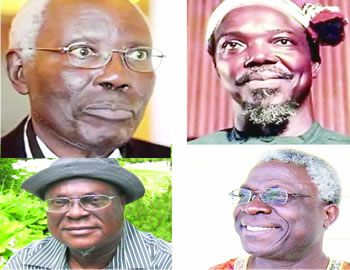The unease over the neglect of indigenous languages by Nigerians has been on for a while now, but last week, the University Press PLC joined the fray by bringing in scholars to discuss how this is affecting the country during its annual Authors’ Forum. ADEWALE OSHODI, who was at the event, reports on such concerns and the solutions proffered.
NIGERIA’s official language is English, and this has definitely suppressed other indigenous languages in the country. In fact, it has reached a situation whereby parents even prefer their children to speak only in the English language, while neglecting the indigenous languages.
While some may feel that they are doing their children a world of good so that they can speak the English language fluently, their neglect of the local languages will come at a cost.
This is, therefore, what the University Press PLC, a foremost publishing company in the country, decided to raise during its 2016 Authors Forum, which was held in Ibadan, the Oyo State capital, last week.
With the theme, Neglect of Nigerian languages and culture: Counting the cost, concerned stakeholders deliberated on the problems and the way forward.
In his opening remarks, the chairman on the occasion, Dr Lalekan Are, lamented how Nigerians are neglecting the local languages in favour of English, saying that a language is just more than a means of communication.
“It influences our culture and even our thought processes.
“On a deeper level, language is an expression of who we are as individuals, communities and nations.
“However, the Western culture that has been perceived as superior to our culture has failed to integrate Africa’s cultural values into its curricula,” Dr Are said, while admitting that though we were colonised by the British, “our culture and languages should not be in shambles; it is always a sad story in our homes and schools, as our children are not allowed to speak their mother tongues as they will be punished for doing so.
“In fact, Nigerian parents today do not speak their native languages to their children, and this is posing a danger on both the survival of our language and culture, and this is definitely why morals have drastically reduced in today’s world.”
In his lecture, Emeritus Professor Ayo Bamgbose, also admitted that Nigerian languages and cultures are losing their status under English dominance in homes, schools, and in the society at large.
Emeritus Professor Bamgbose said the neglect of our languages underlies the ills plaguing our culture, particularly in the area of morals.
The retired professor of English and African Languages explained that our languages have immense knowledge embedded in them, and since we have started neglecting our languages, then we are also neglecting the knowledge in them.
“When we look at countries that use their local languages like Japan, China, Sweden, Norway, among others, then we discover that they are thriving socially and economically.
Emeritus Professor Bamgbose then took the audience on a journey to the past when children were adequately grounded in their mother tongues.
“In fact, some primary schools conducted their teachings in the local languages, and people were doing well academically.
“We can also say Nigeria of the past cannot be compared to Nigeria of today; now, despite the fact that today’s children speak English, this has not reflected in their performances in external examinations like WAEC and NECO.
“However, because one’s thoughts are developed in the mother tongue, then it is important that our local languages are used at the primary level of education, with only English language used in the teaching of the subject.
In the area of governance, Emeritus Professor Bamgbose said because our governance is conducted in the English language, most citizens become uninterested, and are excluded from participating in governance.
“It will, therefore, make sense if we translate our constitution, national anthem and pledge to our local languages,” the professor of English and African languages said, while commending some states Houses of Assembly that have specific days for debating in the local languages.
However, while reacting to Emeritus Professor Bamgbose’s lecture, Professor Femi Osofisan, said one of the problems of using the Yoruba language in education is in Mathematics, explaining that it would be difficult to find Yoruba meanings for different mathematical terms, but this submission was debunked by the lecturer, who said the Yoruba language is so broad that it can come up with meanings for different mathematical concepts.
Professor Niyi Osundare, in his submission, urged the audience not to lose hope, as there was a time English was also trailing Latin in the days of old.
“However, the English people kept using their language, and even at that period, William Shakespeare was just a ‘local’ English writer.
“So we should also not lose hope, but we should get down to work by encouraging our people to speak their local languages,” Professor Osundare said.
For Professor Biola Odejide, while this problem is visible among the middle and upper classes, and urban areas in the country, those from the lower class and rural areas still value the local languages.
“While teaching some secondary school students some years ago, while most of them could understand the English language, they could not communicate in it.
“It should, therefore, be noted that our students will even perform better if they are taught in the local languages, because when you teach them in English, they will first process it into their local languages before they understand what it is all about,” Professor Odejide said.
In his submission, the royal father on the day, Professor Chukwuemeka Ike, lamented that apart from the language, many people no longer value our culture, as well-to-do people even travel to Western countries like the United States and United Kingdom to give birth so that their children will be citizens of these countries and not Nigeria.
“We need to value our culture and our country,” Professor Ike advised.






